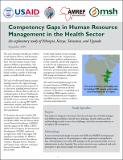| dc.contributor.author | Mwita, Nzomo | |
| dc.contributor.author | O’Neil, Mary | |
| dc.contributor.author | Nyagero, Josephat | |
| dc.contributor.author | Elqura, Loris | |
| dc.date.accessioned | 2022-02-25T14:02:46Z | |
| dc.date.available | 2022-02-25T14:02:46Z | |
| dc.date.issued | 2009-07 | |
| dc.identifier.citation | Mwita, N., Oneil, M., Nyagero, J., & Elqura, L.J. (2009). Competency gaps in human resource management in the health sector: An exploratory study of Ethiopia Kenya Tanzania and Uganda. | en_US |
| dc.identifier.other | Corpus ID: 157257348 | |
| dc.identifier.uri | https://repository.amref.ac.ke/handle/123456789/591 | |
| dc.description | The opinions expressed herein
are those of the author(s) and do not necessarily reflect the views of the US Agency for International Development | en_US |
| dc.description.abstract | The human resource (HR) crisis in health is widely acknowledged. Most countries in sub-Saharan Africa
have clearly identified the HR challenges they face, and many have developed an HR strategy for
addressing the challenges. Progress in achieving the goals of these strategies depends not only on
increasing resources but on managers who are able to lead and manage teams at all levels of the health
system to transform HR strategies, plans, and recommendations into a comprehensive, harmonized
approach that is effectively implemented and sustained. At present, most government HR functions
remain fragmented and, within the health sector, these functions are often either the responsibility of
clinicians who direct health facilities and who have little or no preparation in human resource
management or the responsibility of “personnel administrators” who have been trained to handle routine
civil service policies and procedures.
Despite rising attention to the acute shortage of health care workers, little attention has been paid to the
role of those who have human resource management responsibilities and whose job is to transform
health workers into a productive, motivated, and supported workforce capable of improving health and
saving lives. There is an urgent need to professionalize this role and develop a cadre of well-trained HR
managers, especially in large public sector and private sector health institutions. This would include
expanding both the number of HR managers and the organizational view of their role, as well as updating
their skills. These changes would enable HR managers to be more effective in leading and implementing
positive solutions that in turn would improve the performance and retention of staff.
While many others working in health also have a role to play in supporting the health workforce,
including health managers in general, this report focuses on professionals with a specific responsibility in
human resource management (HRM). HR management is defined as the integrated use of procedures,
policies, and practices to recruit, maintain, and develop employees to strengthen the capacity of an
organization to meet its goals. For the purpose of this study, HRM includes six broad components:
personnel policy, performance management, training, HR data systems, HR strategy development, and
general leadership and management. An HR manager’s role involves one or all of these components.
However, as the responsibility for HRM in health is more often assigned to managers with other roles,
most of the study respondents are managers with dual roles, both clinical and managerial. | en_US |
| dc.description.sponsorship | US Agency for International Development (USAID) | en_US |
| dc.publisher | WHO | en_US |
| dc.subject | Human Resource Management Capacity Building | en_US |
| dc.subject | MSH | en_US |
| dc.subject | Human resource information systems | en_US |
| dc.subject | Management Sciences for Health | en_US |
| dc.subject | HIV/AIDS | en_US |
| dc.title | Competency Gaps in Human Resource Management in the Health Sector An Exploratory Study in Ethiopia, Kenya, Tanzania, and Uganda, 2009 | en_US |

